Literature Review: Factors Influencing Green Consumption in the UAE
VerifiedAdded on 2023/06/11
|5
|966
|93
Literature Review
AI Summary
This literature review examines green consumption trends in the UAE, highlighting the influence of consumer attitudes on environmental sustainability. It discusses government initiatives, such as the Royal ‘Green’ Decree and Masdar City, aimed at promoting a green economy and sustainable development. The review identifies a gap between current consumption levels and environmentally friendly practices, attributing this to a lack of consumer knowledge and awareness. The paper emphasizes the need for continuous input from individuals, manufacturers, and government policies to foster green consumerism. A framework based on the theory of planned behavior is proposed to address inconsistencies between behaviors and attitudes, offering valuable insights for bridging the research gap. Desklib provides more solved assignments.
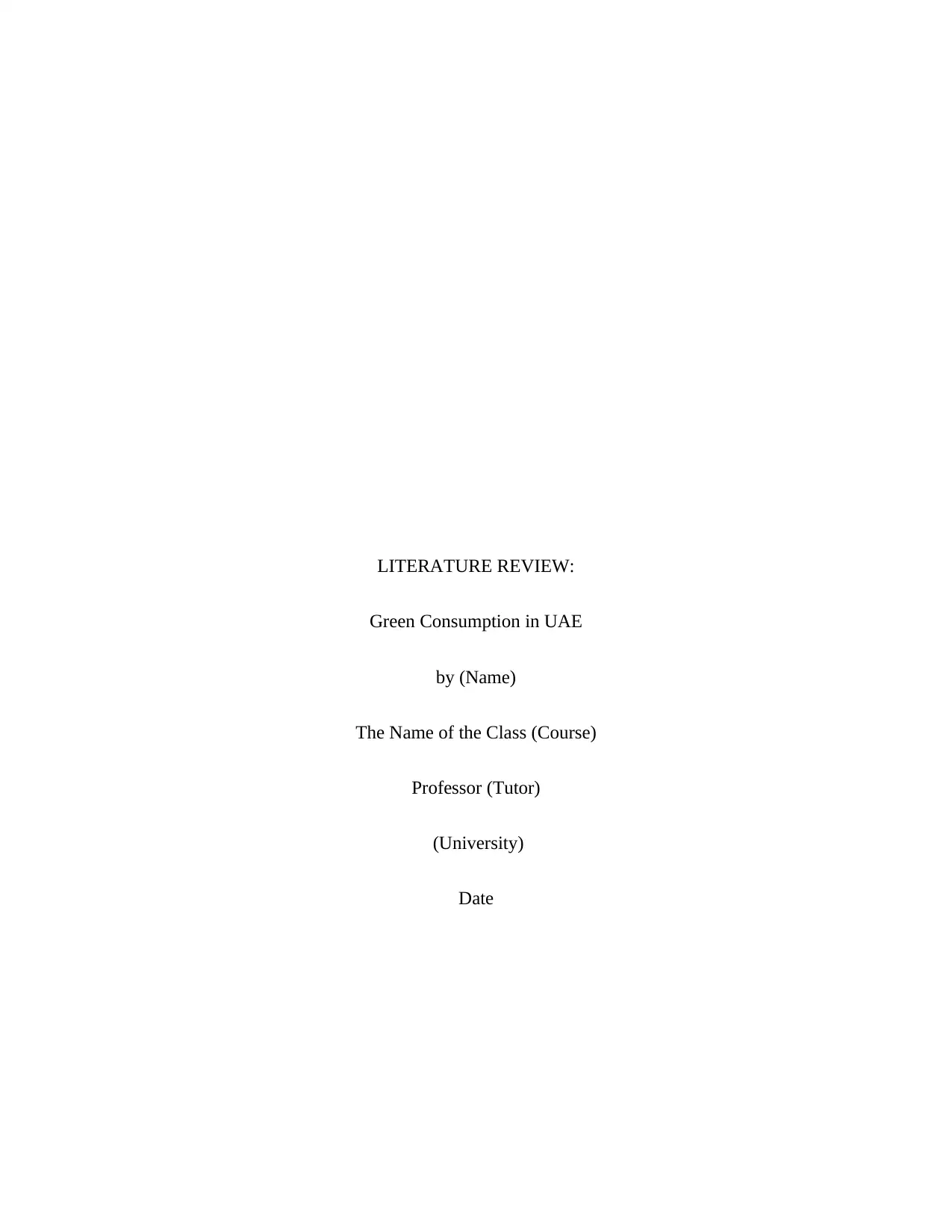
LITERATURE REVIEW:
Green Consumption in UAE
by (Name)
The Name of the Class (Course)
Professor (Tutor)
(University)
Date
Green Consumption in UAE
by (Name)
The Name of the Class (Course)
Professor (Tutor)
(University)
Date
Paraphrase This Document
Need a fresh take? Get an instant paraphrase of this document with our AI Paraphraser
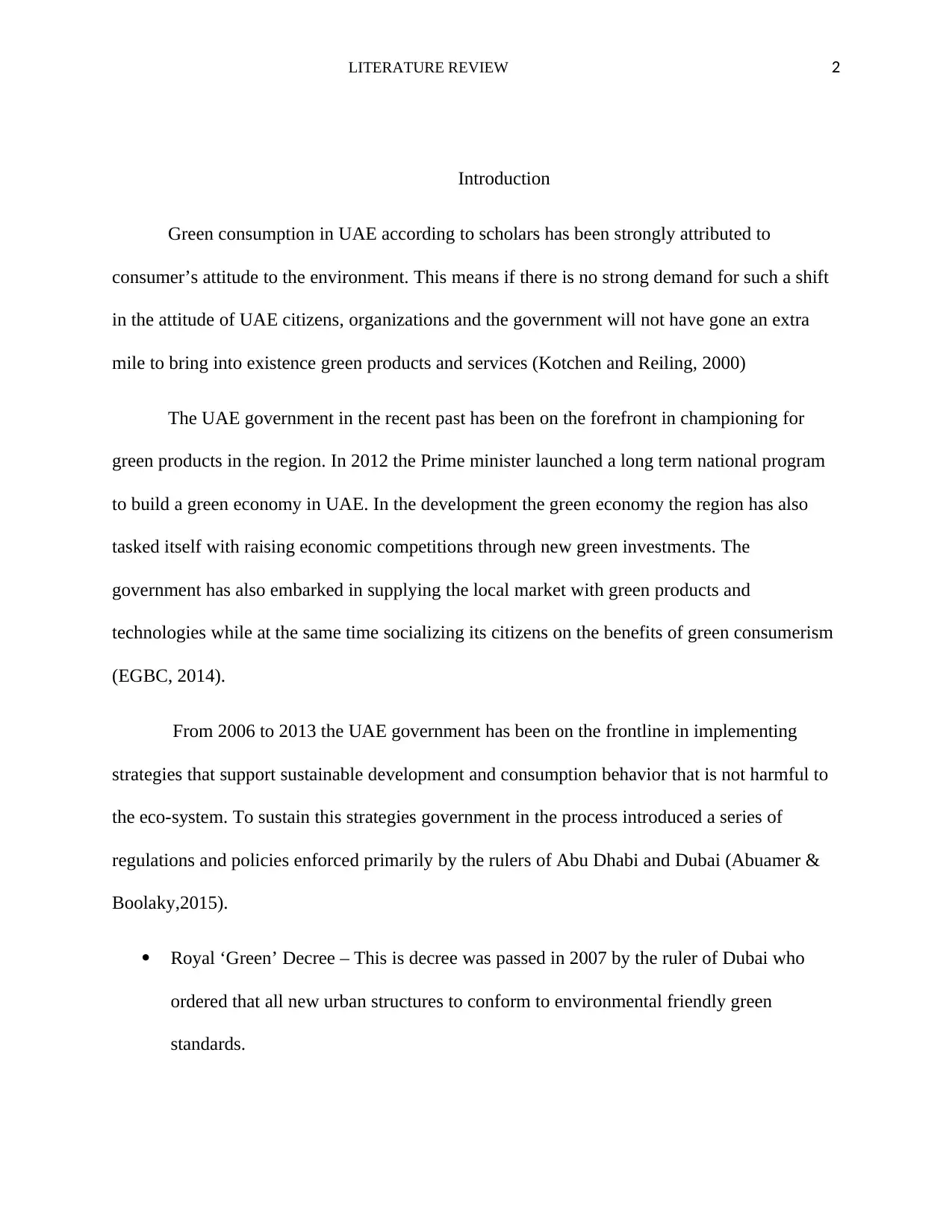
LITERATURE REVIEW 2
Introduction
Green consumption in UAE according to scholars has been strongly attributed to
consumer’s attitude to the environment. This means if there is no strong demand for such a shift
in the attitude of UAE citizens, organizations and the government will not have gone an extra
mile to bring into existence green products and services (Kotchen and Reiling, 2000)
The UAE government in the recent past has been on the forefront in championing for
green products in the region. In 2012 the Prime minister launched a long term national program
to build a green economy in UAE. In the development the green economy the region has also
tasked itself with raising economic competitions through new green investments. The
government has also embarked in supplying the local market with green products and
technologies while at the same time socializing its citizens on the benefits of green consumerism
(EGBC, 2014).
From 2006 to 2013 the UAE government has been on the frontline in implementing
strategies that support sustainable development and consumption behavior that is not harmful to
the eco-system. To sustain this strategies government in the process introduced a series of
regulations and policies enforced primarily by the rulers of Abu Dhabi and Dubai (Abuamer &
Boolaky,2015).
Royal ‘Green’ Decree – This is decree was passed in 2007 by the ruler of Dubai who
ordered that all new urban structures to conform to environmental friendly green
standards.
Introduction
Green consumption in UAE according to scholars has been strongly attributed to
consumer’s attitude to the environment. This means if there is no strong demand for such a shift
in the attitude of UAE citizens, organizations and the government will not have gone an extra
mile to bring into existence green products and services (Kotchen and Reiling, 2000)
The UAE government in the recent past has been on the forefront in championing for
green products in the region. In 2012 the Prime minister launched a long term national program
to build a green economy in UAE. In the development the green economy the region has also
tasked itself with raising economic competitions through new green investments. The
government has also embarked in supplying the local market with green products and
technologies while at the same time socializing its citizens on the benefits of green consumerism
(EGBC, 2014).
From 2006 to 2013 the UAE government has been on the frontline in implementing
strategies that support sustainable development and consumption behavior that is not harmful to
the eco-system. To sustain this strategies government in the process introduced a series of
regulations and policies enforced primarily by the rulers of Abu Dhabi and Dubai (Abuamer &
Boolaky,2015).
Royal ‘Green’ Decree – This is decree was passed in 2007 by the ruler of Dubai who
ordered that all new urban structures to conform to environmental friendly green
standards.
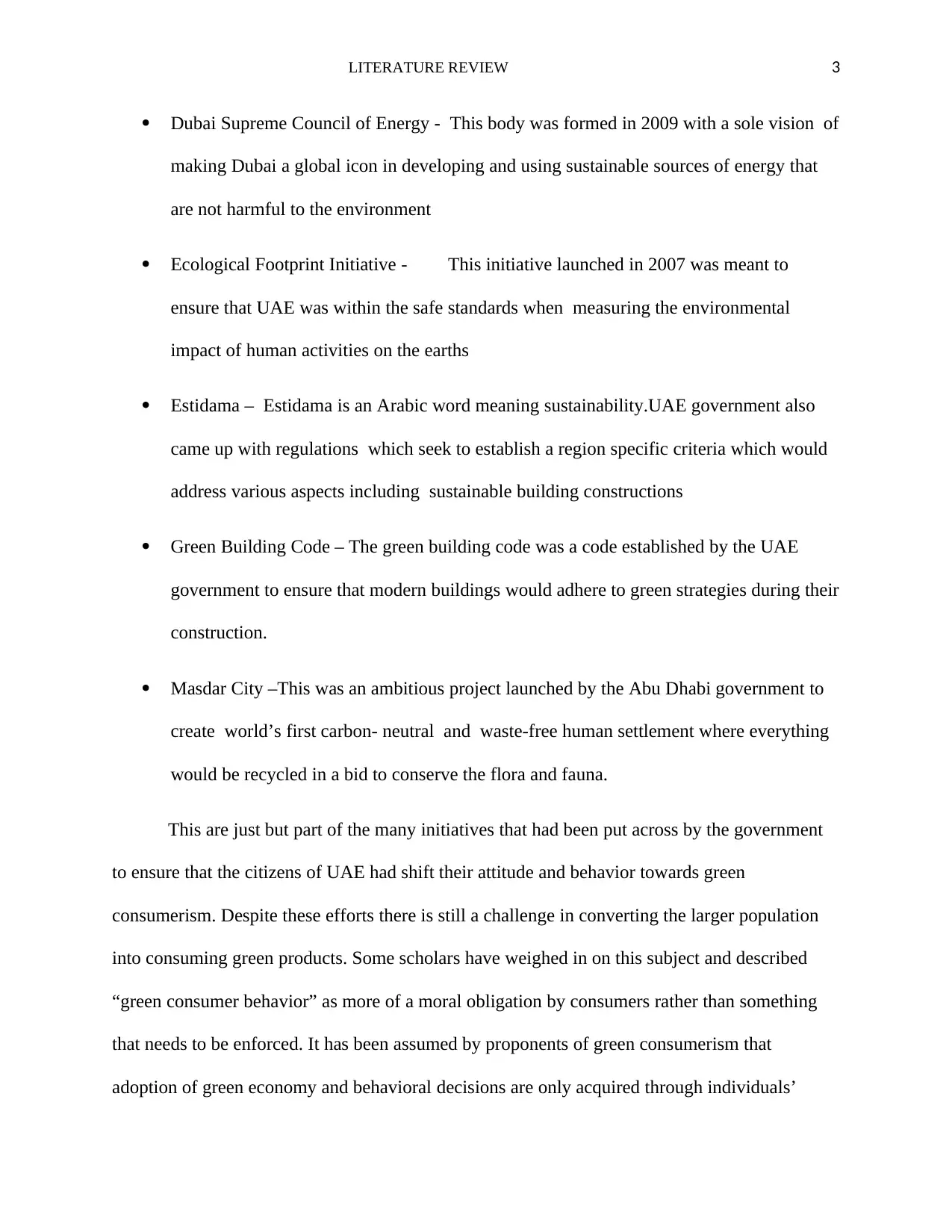
LITERATURE REVIEW 3
Dubai Supreme Council of Energy - This body was formed in 2009 with a sole vision of
making Dubai a global icon in developing and using sustainable sources of energy that
are not harmful to the environment
Ecological Footprint Initiative - This initiative launched in 2007 was meant to
ensure that UAE was within the safe standards when measuring the environmental
impact of human activities on the earths
Estidama – Estidama is an Arabic word meaning sustainability.UAE government also
came up with regulations which seek to establish a region specific criteria which would
address various aspects including sustainable building constructions
Green Building Code – The green building code was a code established by the UAE
government to ensure that modern buildings would adhere to green strategies during their
construction.
Masdar City –This was an ambitious project launched by the Abu Dhabi government to
create world’s first carbon- neutral and waste-free human settlement where everything
would be recycled in a bid to conserve the flora and fauna.
This are just but part of the many initiatives that had been put across by the government
to ensure that the citizens of UAE had shift their attitude and behavior towards green
consumerism. Despite these efforts there is still a challenge in converting the larger population
into consuming green products. Some scholars have weighed in on this subject and described
“green consumer behavior” as more of a moral obligation by consumers rather than something
that needs to be enforced. It has been assumed by proponents of green consumerism that
adoption of green economy and behavioral decisions are only acquired through individuals’
Dubai Supreme Council of Energy - This body was formed in 2009 with a sole vision of
making Dubai a global icon in developing and using sustainable sources of energy that
are not harmful to the environment
Ecological Footprint Initiative - This initiative launched in 2007 was meant to
ensure that UAE was within the safe standards when measuring the environmental
impact of human activities on the earths
Estidama – Estidama is an Arabic word meaning sustainability.UAE government also
came up with regulations which seek to establish a region specific criteria which would
address various aspects including sustainable building constructions
Green Building Code – The green building code was a code established by the UAE
government to ensure that modern buildings would adhere to green strategies during their
construction.
Masdar City –This was an ambitious project launched by the Abu Dhabi government to
create world’s first carbon- neutral and waste-free human settlement where everything
would be recycled in a bid to conserve the flora and fauna.
This are just but part of the many initiatives that had been put across by the government
to ensure that the citizens of UAE had shift their attitude and behavior towards green
consumerism. Despite these efforts there is still a challenge in converting the larger population
into consuming green products. Some scholars have weighed in on this subject and described
“green consumer behavior” as more of a moral obligation by consumers rather than something
that needs to be enforced. It has been assumed by proponents of green consumerism that
adoption of green economy and behavioral decisions are only acquired through individuals’
⊘ This is a preview!⊘
Do you want full access?
Subscribe today to unlock all pages.

Trusted by 1+ million students worldwide
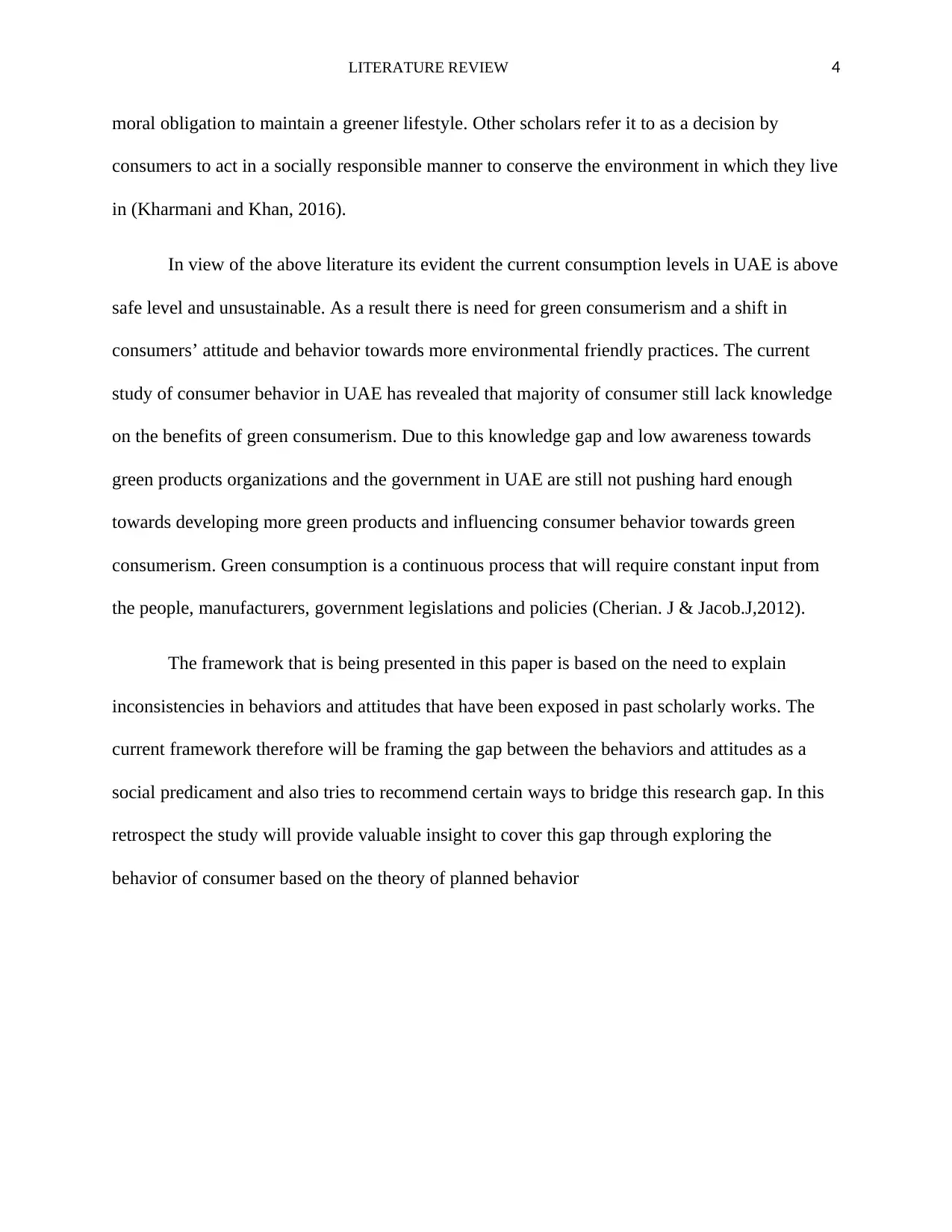
LITERATURE REVIEW 4
moral obligation to maintain a greener lifestyle. Other scholars refer it to as a decision by
consumers to act in a socially responsible manner to conserve the environment in which they live
in (Kharmani and Khan, 2016).
In view of the above literature its evident the current consumption levels in UAE is above
safe level and unsustainable. As a result there is need for green consumerism and a shift in
consumers’ attitude and behavior towards more environmental friendly practices. The current
study of consumer behavior in UAE has revealed that majority of consumer still lack knowledge
on the benefits of green consumerism. Due to this knowledge gap and low awareness towards
green products organizations and the government in UAE are still not pushing hard enough
towards developing more green products and influencing consumer behavior towards green
consumerism. Green consumption is a continuous process that will require constant input from
the people, manufacturers, government legislations and policies (Cherian. J & Jacob.J,2012).
The framework that is being presented in this paper is based on the need to explain
inconsistencies in behaviors and attitudes that have been exposed in past scholarly works. The
current framework therefore will be framing the gap between the behaviors and attitudes as a
social predicament and also tries to recommend certain ways to bridge this research gap. In this
retrospect the study will provide valuable insight to cover this gap through exploring the
behavior of consumer based on the theory of planned behavior
moral obligation to maintain a greener lifestyle. Other scholars refer it to as a decision by
consumers to act in a socially responsible manner to conserve the environment in which they live
in (Kharmani and Khan, 2016).
In view of the above literature its evident the current consumption levels in UAE is above
safe level and unsustainable. As a result there is need for green consumerism and a shift in
consumers’ attitude and behavior towards more environmental friendly practices. The current
study of consumer behavior in UAE has revealed that majority of consumer still lack knowledge
on the benefits of green consumerism. Due to this knowledge gap and low awareness towards
green products organizations and the government in UAE are still not pushing hard enough
towards developing more green products and influencing consumer behavior towards green
consumerism. Green consumption is a continuous process that will require constant input from
the people, manufacturers, government legislations and policies (Cherian. J & Jacob.J,2012).
The framework that is being presented in this paper is based on the need to explain
inconsistencies in behaviors and attitudes that have been exposed in past scholarly works. The
current framework therefore will be framing the gap between the behaviors and attitudes as a
social predicament and also tries to recommend certain ways to bridge this research gap. In this
retrospect the study will provide valuable insight to cover this gap through exploring the
behavior of consumer based on the theory of planned behavior
Paraphrase This Document
Need a fresh take? Get an instant paraphrase of this document with our AI Paraphraser
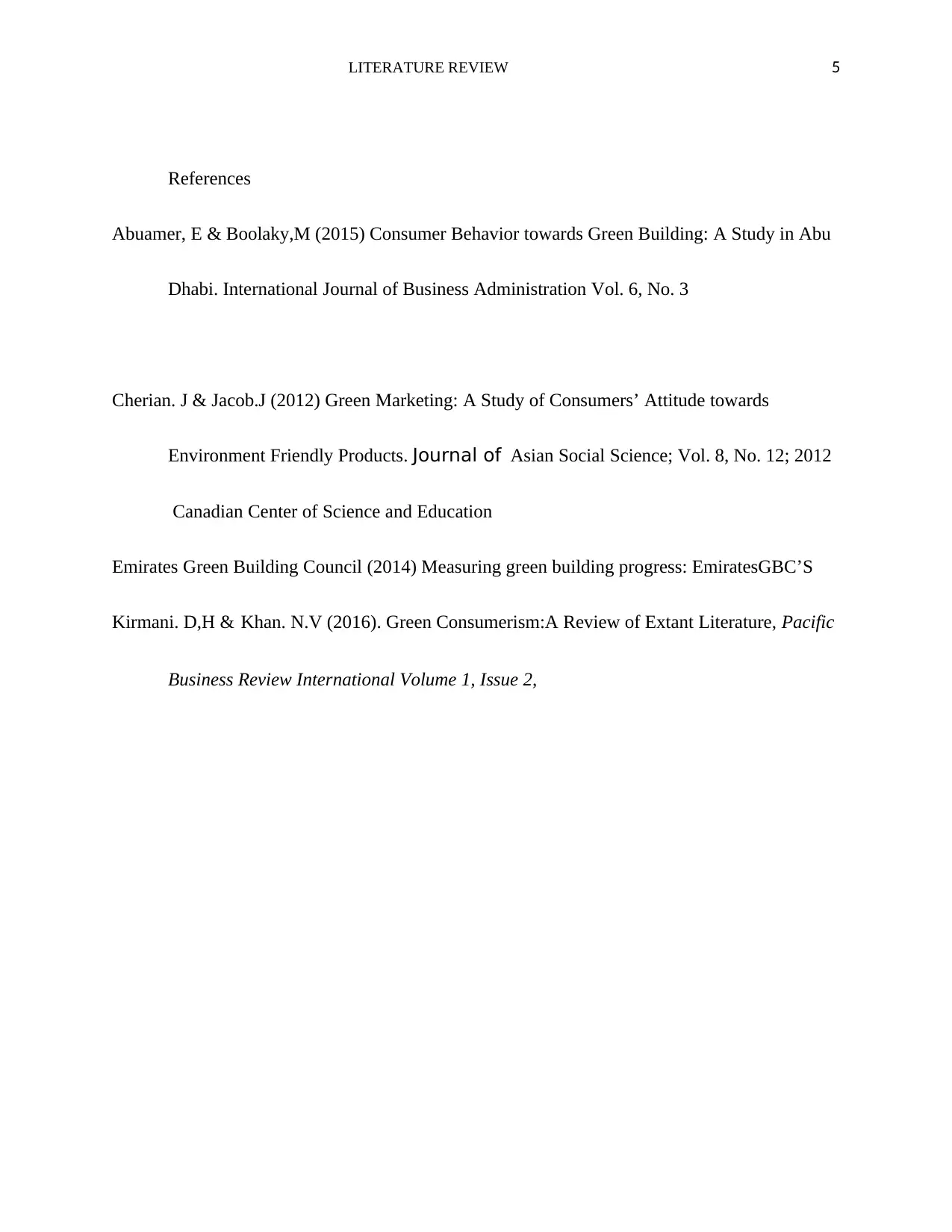
LITERATURE REVIEW 5
References
Abuamer, E & Boolaky,M (2015) Consumer Behavior towards Green Building: A Study in Abu
Dhabi. International Journal of Business Administration Vol. 6, No. 3
Cherian. J & Jacob.J (2012) Green Marketing: A Study of Consumers’ Attitude towards
Environment Friendly Products. Journal of Asian Social Science; Vol. 8, No. 12; 2012
Canadian Center of Science and Education
Emirates Green Building Council (2014) Measuring green building progress: EmiratesGBC’S
Kirmani. D,H & Khan. N.V (2016). Green Consumerism:A Review of Extant Literature, Pacific
Business Review International Volume 1, Issue 2,
References
Abuamer, E & Boolaky,M (2015) Consumer Behavior towards Green Building: A Study in Abu
Dhabi. International Journal of Business Administration Vol. 6, No. 3
Cherian. J & Jacob.J (2012) Green Marketing: A Study of Consumers’ Attitude towards
Environment Friendly Products. Journal of Asian Social Science; Vol. 8, No. 12; 2012
Canadian Center of Science and Education
Emirates Green Building Council (2014) Measuring green building progress: EmiratesGBC’S
Kirmani. D,H & Khan. N.V (2016). Green Consumerism:A Review of Extant Literature, Pacific
Business Review International Volume 1, Issue 2,
1 out of 5
Your All-in-One AI-Powered Toolkit for Academic Success.
+13062052269
info@desklib.com
Available 24*7 on WhatsApp / Email
![[object Object]](/_next/static/media/star-bottom.7253800d.svg)
Unlock your academic potential
Copyright © 2020–2026 A2Z Services. All Rights Reserved. Developed and managed by ZUCOL.

